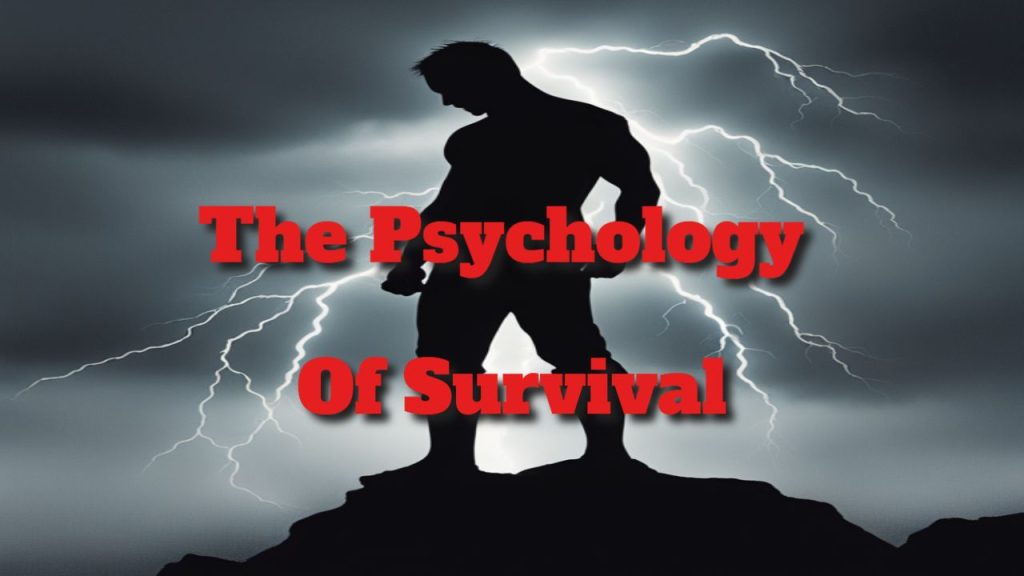Discover Powerful Techniques to Master Survival Psychology in High-Stress Environments
The saying “desperate times call for desperate measures” encapsulates the profound essence of survival, particularly as we delve into the intricate dynamics of survival psychology. In times of extreme threat, the human psyche experiences a remarkable transformation, activating deep reservoirs of strength and resilience that typically remain underutilized in our daily routines. This transformation is not merely about reacting; rather, it represents a holistic mobilization of both our mental and emotional faculties. It highlights the astonishing potential of our minds when confronted with adversity. Gaining insight into these psychological shifts is vital for anyone aiming to enhance their survival abilities and bolster their mental resilience.
During critical moments of danger, a complex interplay of psychological mechanisms emerges. What exactly happens in our minds when every second is precious? How do we reach crucial decisions while being overwhelmed by pressure? Furthermore, how does our intrinsic psychological framework influence our ability to endure, adapt, and ultimately thrive amidst chaos? These fundamental questions are central to understanding the intricacies of survival psychology, which we will thoroughly explore in this detailed article. By illuminating the essential elements that empower us to withstand hardship, we can derive valuable lessons about our innate capabilities and behavioral responses in times of crisis.
Join us on an enlightening journey into the fascinating realm of survival psychology, where we will analyze its complexities and reveal the key factors that shape our ability to overcome obstacles and succeed in life-threatening situations.
Understanding the Role of Fear in Shaping Survival Responses and Reactions
Fear is a fundamental element of our survival instincts, serving as a primal response that equips our bodies to react swiftly to potential threats. This intense emotion initiates a series of physiological changes designed to enhance our chances of survival during perilous encounters. When fear grips us, our heart rate increases, breathing becomes rapid, and muscles tense up, creating a heightened state of alertness that prepares us for immediate action. Recognizing this physiological response is crucial for anyone aiming to improve their survival instincts and responses.
This acute state of readiness sharpens our reflexes, enabling rapid decision-making and empowering us to confront imminent dangers effectively. Moreover, fear enhances our sensory awareness, allowing us to perceive our surroundings more acutely and identify potential threats that might otherwise go unnoticed. It compels us to focus intensely on our environment, increasing vigilance and aiding in the recognition of critical warning signs essential for survival. Without the presence of fear, our ability to navigate hazardous scenarios could be severely compromised, underscoring its indispensable role in our survival toolkit. By understanding the intricate relationship between fear and survival mechanisms, we gain deeper insight into the complexities of the human experience while equipping ourselves with practical knowledge applicable in real-world situations.
Building Resilience to Successfully Tackle Life’s Most Difficult Challenges
In the face of fear during high-stakes scenarios, the capacity to cultivate resilience becomes paramount for maintaining the fight for survival. Resilience is defined as the ability to recover from adversity, adapt to challenges, and bounce back from setbacks, even when confronted with significant obstacles. This essential quality often separates those who succumb to despair from those who muster the inner strength to persevere in their survival efforts. Actively cultivating resilience is a proactive measure anyone can take to enhance their overall life experience and mental well-being.
Importantly, resilience does not imply the absence of fear or pain; rather, it embodies the steadfast determination to move forward despite emotional turmoil. It involves nurturing a positive mindset, establishing realistic goals, and skillfully utilizing available resources to navigate life’s challenges. By fostering resilience, individuals empower themselves to tackle life’s obstacles confidently, equipped with the insights and strategies necessary to succeed. This transformative mindset not only proves beneficial in survival situations but also enriches one’s broader life experience, instilling hope and enabling individuals to approach future challenges with renewed vigor and resolve.
Enhancing Decision-Making Skills Under Pressure for Optimal Outcomes
The ability to make informed decisions can be significantly hampered in high-stress environments. The inherent pressure and urgency that characterize these critical moments can cloud our judgment, leading to hasty or poorly thought-out choices. During intense stressful episodes, the brain triggers a heightened state of arousal, activating the fight-or-flight response, which can overwhelm rational thought processes and compel individuals to depend more on instinct than on reasoned deliberation. Recognizing these patterns is essential for developing effective strategies to improve decision-making under pressure.
This physiological response can impede cognitive functions, making it increasingly challenging to process information and weigh the pros and cons of different options. To counteract these effects, it is crucial to understand how stress influences decision-making and to actively implement strategies that mitigate its impact. Techniques such as deep breathing exercises, allowing for brief moments of reflection, or consulting trusted individuals can significantly enhance one’s ability to make informed and effective choices. By sharpening decision-making skills in high-pressure contexts, individuals can greatly improve their chances of successfully navigating through challenging and potentially life-threatening situations.
The Vital Importance of Social Support in Managing Crisis Situations
Grasping the significance of social support is essential for effectively managing stressful circumstances. A strong network of friends, family, and colleagues provides invaluable assistance and resources, empowering individuals to cope and thrive during challenging times. The emotional support, practical help, and sense of community that social connections offer are crucial for fostering resilience and promoting overall well-being. In any crisis, the strength derived from social support can be a game changer, providing the encouragement needed to face adversity head-on.
Research consistently shows that individuals with robust social networks experience better mental health outcomes and recover more quickly from traumatic events. Additionally, having a support system enhances problem-solving abilities, introduces new perspectives, and offers essential motivation and encouragement. Recognizing the transformative power of social networks during crises can significantly enhance one’s experience, allowing individuals to draw strength and insights from others when needed. Engaging with a supportive community not only aids in coping with immediate challenges but also contributes to long-term emotional resilience and recovery, reinforcing the notion that we are not alone in our struggles.
 Implementing Effective Coping Strategies for High-Stress Scenarios
Implementing Effective Coping Strategies for High-Stress Scenarios
What actionable strategies can be employed to effectively navigate life-threatening situations? Here are some practical tips:
– Maintain Calmness and Focus: Take a moment to breathe deeply and assess your surroundings before taking action. This approach can help clarify your thoughts and sharpen your focus.
Prioritize Safety: Always protect yourself and others by seeking shelter or moving away from imminent threats whenever possible. Your safety should always be the foremost concern.
– Stay Aware: Remain vigilant regarding your surroundings, paying close attention to potential dangers or changes in the environment that could impact your safety.
– Communicate Clearly: If necessary, signal for assistance or inform others of the danger you are facing. Effective communication can be critical in survival scenarios.
– Trust Your Instincts: Rely on your gut feelings and make prompt decisions based on the information available to you. Your instincts can provide invaluable guidance in critical moments.
– Utilize Available Resources: Maximize the use of all available tools and resources to enhance your chances of survival, whether they are physical tools or social support systems.
– Maintain an Optimistic Mindset: Cultivate a belief in your ability to overcome the situation. A positive outlook can significantly influence your resilience and responses during crises.
Effective Coping Strategies for Trauma Survivors and Individuals Dealing with PTSD
For individuals with a history of trauma or PTSD, implementing effective coping strategies during life-threatening situations is crucial for managing anxiety and fostering resilience. Tailoring these strategies can empower individuals to regain control over their responses and navigate challenging scenarios more effectively.
– Practice Deep Breathing Techniques: Employ grounding strategies to stabilize anxiety levels and foster a sense of calm. Deep breathing can help center your thoughts and mitigate feelings of panic.
– Seek Social Support: Don’t hesitate to reach out to friends, family, or mental health professionals for assistance. Connecting with others can provide critical support during difficult times.
– Engage in Self-Care Practices: Prioritize activities that promote mental and physical well-being, aiding in recovery and resilience-building over time.
These coping mechanisms are essential for managing anxiety and cultivating resilience. It is important to recognize that resilience is not merely an inherent trait; it can be actively nurtured through consistent practice and support. With the right strategies in place, anyone—regardless of their background—can enhance their capacity to recover from adverse situations.
Moreover, understanding how decision-making under stress affects long-term mental health and recovery from traumatic events is paramount. The manner in which decisions are made during high-pressure situations can significantly influence recovery trajectories and overall mental health following life-threatening experiences.
Identifying the psychological barriers individuals face when seeking social support during crises is equally crucial. Common challenges encountered during these pivotal moments may include feelings of vulnerability, fear of judgment, trust issues, and difficulties in articulating one’s needs. Recognizing these obstacles is essential, as they can hinder the process of seeking help and exacerbate stress and anxiety.
To effectively navigate these hurdles and access the necessary support, consider taking manageable steps such as confiding in a trusted friend, consulting a mental health professional, or joining a support group. Remember that seeking help is a courageous step, and there are people who are ready and willing to assist you when you need it most.
Delving Deeper into the Fascinating Realm of Survival Psychology
The psychology of survival represents a rich and multifaceted area of exploration that offers profound insights into human behavior. While anxiety is a natural reaction to life-threatening events, resilience empowers us to recover from adversity and continue progressing forward. By understanding how stress impacts decision-making, we can significantly bolster our chances of survival. Additionally, recognizing the vital role of social support provides the essential strength and comfort needed during challenging times.
Utilizing effective coping strategies empowers us to navigate complex and life-threatening situations more adeptly, ultimately leading to enhanced resilience and improved mental health outcomes. This exploration of survival psychology not only deepens our understanding of our own abilities but also equips us with the practical tools necessary to confront unexpected challenges with confidence and determination.
Your Questions About Survival Psychology Addressed
How do anxiety disorders influence survival psychology?
What psychological differences exist in survival responses between individuals with anxiety disorders and those without?
Individuals with anxiety disorders may demonstrate heightened reactions to fear and stress, while those without may engage in more adaptive coping strategies, resulting in varying survival outcomes.
What are the most effective coping mechanisms for trauma survivors or individuals with PTSD during survival scenarios?
The Article Survival Psychology: Understanding the Mindset Appeared First On Survival Avenue.
The post Survival Psychology: Mastering the Mindset appeared first on Survival Bite.
The Article Survival Psychology: Unlocking Your Mental Resilience Was Found On https://limitsofstrategy.com




Comments are closed